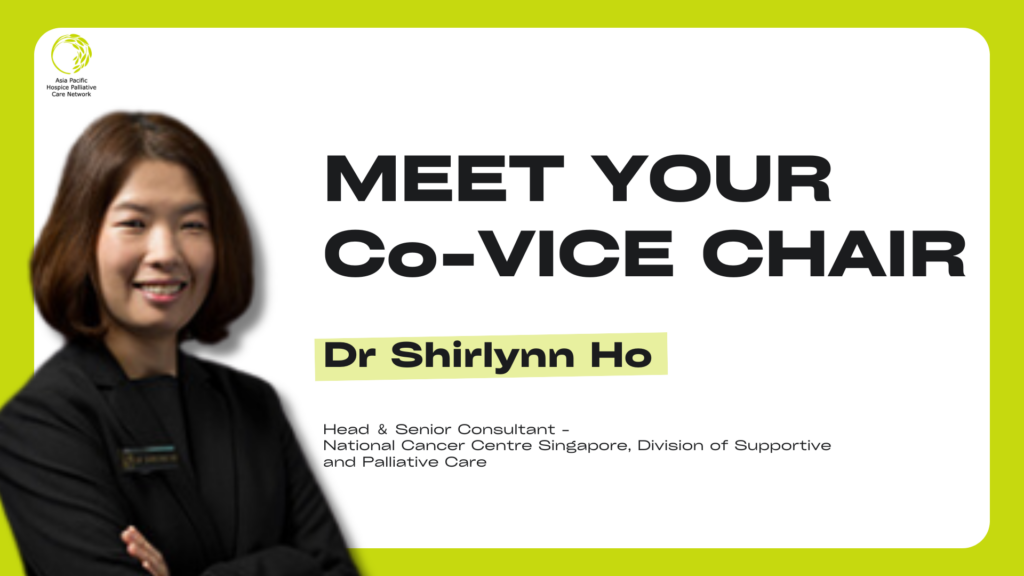
Dr Shirlynn Ho is currently the Head & Senior Consultant in the Division of Supportive and Palliative Care, National Cancer Centre Singapore and is serving as APHN’s co-Vice Chair.
Can you share a memorable story from your career that has shaped your perspective?
I was a junior medical officer who had just completed my 6-month posting in palliative care and posted to general medicine department in a hospital which provides treatment for prisoners who are ill.
I was on call one night and called to assess a patient from the prison ward. He had advanced lung cancer and was dying from it. He was breathless, barely rousable, with no one by his side. I assessed him to be gravely ill and wanted to order up intravenous morphine for his breathlessness, the least I could do was to grant him some relief from his breathlessness. I did not know if he had any family, nor could I contact them directly. After prescribing morphine infusion and a stat dose of morphine, I left the ward to care for other patients. But when I returned 15 minutes later, the morphine was still not available in the ward. I received a call from the nurse manager dissuading me from prescribing morphine for that patient. But I was insistent, I knew he had the indications for it, I know how to prescribe safely, and he is going to die breathless if we do not administer it soon. A while later, I received a call from the medical registrar on-call that night. He also expressed concerns about administering morphine for breathlessness and what more for a prisoner. Despite my protest and assurance that I had done my previous posting in palliative care and know that the morphine infusion will help symptoms and not shorten his life, the registrar, as well as the nurses in the ward, would not provide me with the morphine supply to administer. I had offered to give stat doses and keep coming back to review the patient.
That was the longest night call of my career 18 years ago. I was devastated, crying throughout the night, even as I zipped around the medical wards and the prison ward attending to patients. I kept returning to the prison ward, but I could only watch him from the glass panel from the nursing station as he lay breathless in his last moments, alone. He passed on early next morning after my call, I did not know if the primary team ever prescribed morphine for him.
I still hold regrets over this, looking back now as a palliative care physician, could I not have called the consultant (on stay-out call) to make my case? Would my presence, just staying by his side, have made a difference? I will never know for this patient.
I realised that this is a vulnerable population in our midst, their freedom taken away for their wrongs, but their rights to dignified end-of-life care hang by a thread. This population holds a special place in my heart, and I was most glad to be able to work with the prison service to enable the external placement scheme for prisoners who require hospice care and could not be discharged from prison. They can be admitted to the inpatient hospice and even homecare, if they have family who can care for them.
What’s your favorite way to spend time with family or friends?
Trying out new experiences together, like travelling, dining at a new restaurant or just hanging out alongside each other as we each do what we enjoy. We do not have to be doing the same activity but just enjoying each other’s company as we read, watch Netflix in the same room.
What’s your favorite meal or cuisine?
Hakka food, home-cooked by my mother. My mom only cooks Hakka dishes for special occasions as it takes so much effort from even the day before. So, birthdays, Chinese New Year dinners, Christmas dinners are times I get to enjoy home cooked Hakka food. This is another benefit for anyone of us returning after a long trip from overseas, we can have Hakka food as we gather around the table. This is my mother’s way of showing love.
